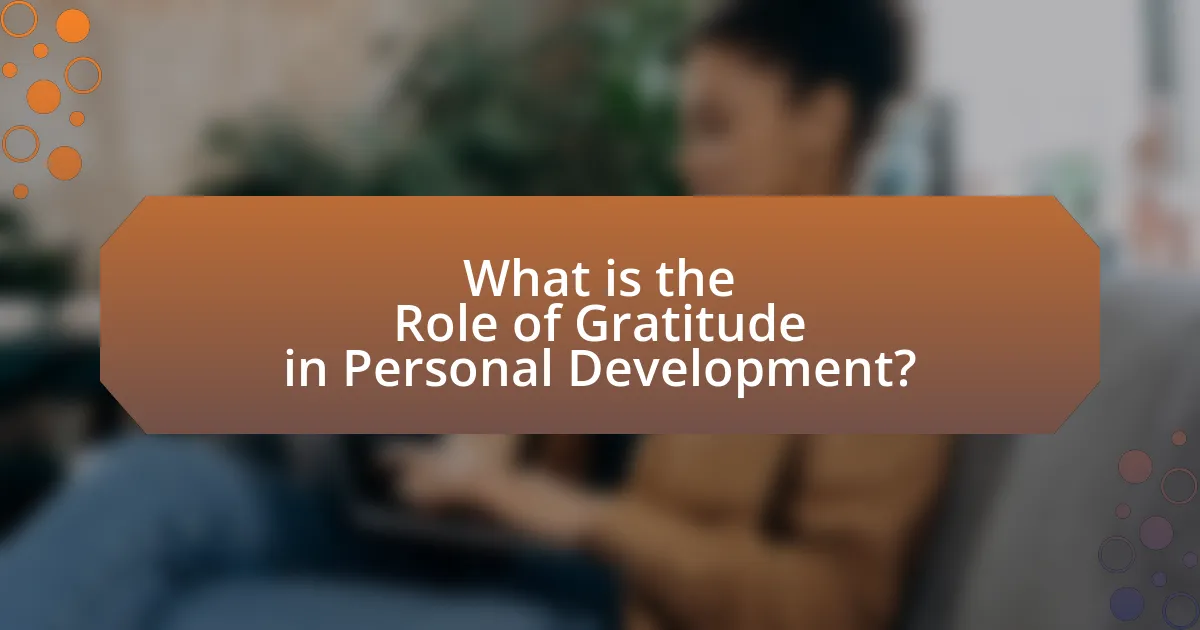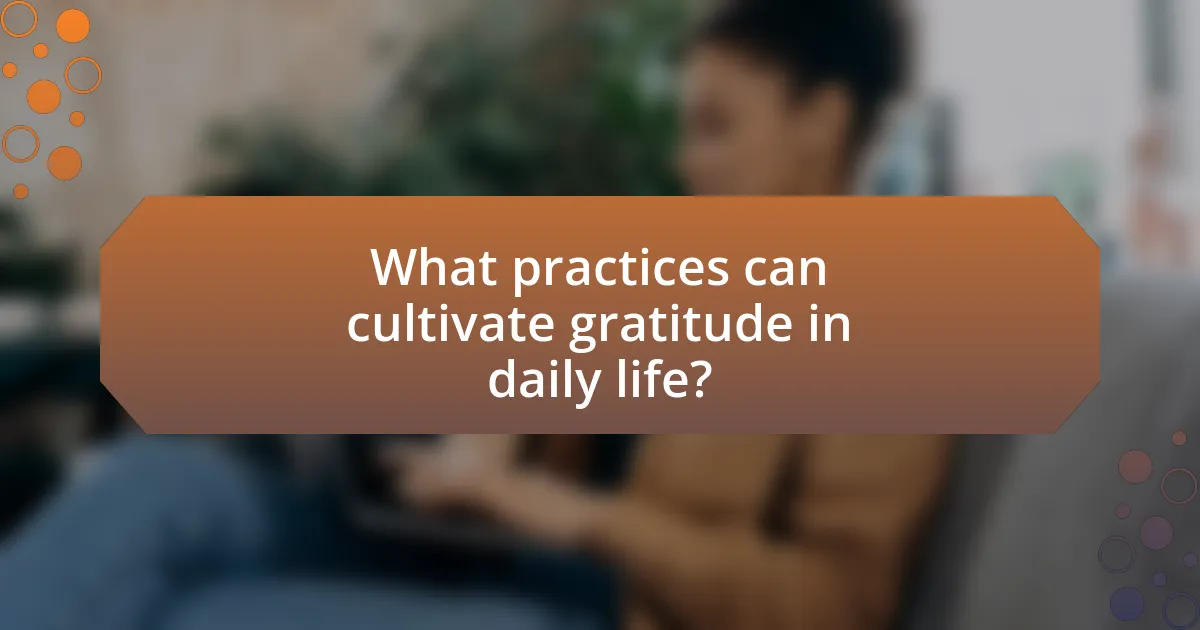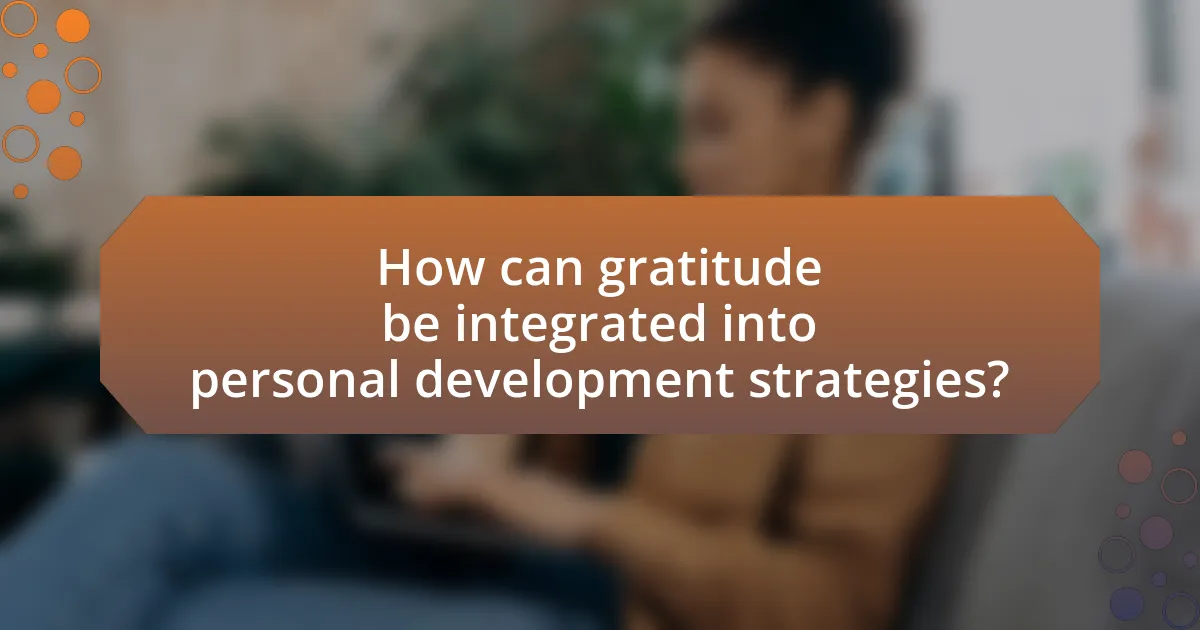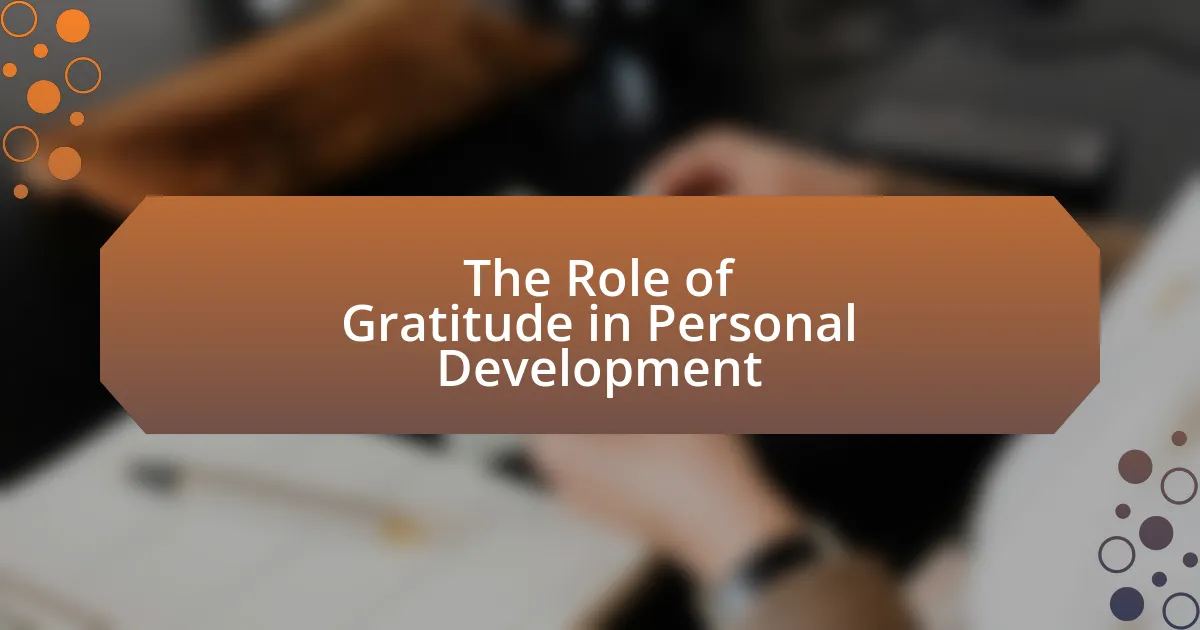The article examines the significant role of gratitude in personal development, highlighting its impact on emotional well-being and resilience. It discusses how practicing gratitude can lead to improved mental health outcomes, such as reduced symptoms of depression and anxiety, and fosters a positive mindset that encourages personal growth. Key psychological mechanisms involved include enhanced emotional regulation, increased resilience, and improved social connections. The article also outlines practical strategies for cultivating gratitude, such as journaling and mindfulness practices, and addresses common obstacles to gratitude practice, providing effective solutions to overcome them.

What is the Role of Gratitude in Personal Development?
Gratitude plays a crucial role in personal development by enhancing emotional well-being and fostering resilience. Research indicates that practicing gratitude can lead to improved mental health outcomes, such as reduced symptoms of depression and anxiety. A study published in the Journal of Personality and Social Psychology by Emmons and McCullough (2003) found that individuals who regularly engaged in gratitude exercises reported higher levels of positive emotions and life satisfaction. This emotional uplift can motivate individuals to pursue personal goals and develop healthier relationships, thereby facilitating overall personal growth.
How does gratitude influence personal growth?
Gratitude significantly influences personal growth by fostering a positive mindset and enhancing emotional well-being. Research indicates that individuals who regularly practice gratitude experience increased levels of happiness and reduced symptoms of depression. A study published in the Journal of Personality and Social Psychology by Emmons and McCullough found that participants who kept gratitude journals reported higher levels of positive emotions, life satisfaction, and optimism compared to those who did not engage in this practice. This positive emotional state encourages individuals to pursue personal goals, build resilience, and develop stronger relationships, all of which are essential components of personal growth.
What psychological mechanisms are involved in gratitude’s impact on personal development?
Gratitude impacts personal development through several psychological mechanisms, including enhanced emotional regulation, increased resilience, and improved social connections. Emotional regulation occurs as gratitude fosters positive emotions, which can counteract negative feelings and promote a more optimistic outlook. Research by Emmons and McCullough (2003) demonstrated that individuals who practice gratitude report higher levels of well-being and lower levels of depression.
Increased resilience is another mechanism, as gratitude helps individuals cope with stress and adversity by shifting focus from challenges to positive aspects of life. A study by Wood, Froh, and Geraghty (2010) found that gratitude is linked to greater psychological resilience, enabling individuals to bounce back from setbacks more effectively.
Improved social connections arise from gratitude, as expressing appreciation strengthens relationships and fosters a sense of belonging. According to a study by Algoe, Haidt, and Gable (2008), gratitude enhances prosocial behavior, leading to stronger interpersonal bonds, which are crucial for personal development. These mechanisms collectively contribute to an individual’s growth and overall well-being.
How does gratitude affect emotional well-being and resilience?
Gratitude significantly enhances emotional well-being and resilience by fostering positive emotions and reducing negative ones. Research indicates that individuals who regularly practice gratitude experience lower levels of depression and anxiety, leading to improved overall mental health. A study published in the Journal of Personality and Social Psychology by Emmons and McCullough (2003) found that participants who kept gratitude journals reported higher levels of positive affect and life satisfaction compared to those who did not engage in this practice. Furthermore, gratitude promotes resilience by helping individuals cope with stress and adversity, as it encourages a focus on positive aspects of life, thereby enhancing one’s ability to recover from challenges.
Why is gratitude considered essential for self-improvement?
Gratitude is considered essential for self-improvement because it fosters a positive mindset that enhances emotional well-being and resilience. Research indicates that practicing gratitude can lead to increased levels of happiness and reduced symptoms of depression, as evidenced by a study published in the Journal of Personality and Social Psychology, which found that individuals who regularly express gratitude report higher life satisfaction and improved mental health. This positive emotional state encourages individuals to pursue personal goals and develop healthier relationships, thereby facilitating continuous self-improvement.
What are the long-term benefits of practicing gratitude?
Practicing gratitude leads to significant long-term benefits, including improved mental health, enhanced relationships, and increased resilience. Research indicates that individuals who regularly express gratitude experience lower levels of depression and anxiety, as gratitude fosters positive emotions and reduces negative thought patterns. A study published in the Journal of Personality and Social Psychology by Emmons and McCullough found that participants who kept gratitude journals reported higher levels of well-being and life satisfaction over time. Additionally, gratitude strengthens social bonds, as expressing appreciation can deepen connections with others, leading to more supportive relationships. Furthermore, gratitude enhances resilience by promoting a positive outlook, which helps individuals cope better with stress and adversity.
How does gratitude enhance relationships and social connections?
Gratitude enhances relationships and social connections by fostering positive interactions and increasing feelings of trust and support among individuals. When people express gratitude, it strengthens their bonds, as studies show that gratitude promotes prosocial behavior, leading to increased cooperation and reciprocity. Research published in the journal “Emotion” by Algoe, Haidt, and Gable (2008) found that expressing gratitude can enhance relationship satisfaction and encourage individuals to engage more deeply with one another, thereby creating a more supportive social network.

What practices can cultivate gratitude in daily life?
Practices that can cultivate gratitude in daily life include keeping a gratitude journal, expressing appreciation to others, and engaging in mindfulness meditation. Keeping a gratitude journal involves writing down three to five things each day that one is thankful for, which has been shown to increase overall well-being and life satisfaction. Expressing appreciation to others, whether through verbal acknowledgment or written notes, strengthens relationships and fosters a positive environment. Mindfulness meditation encourages individuals to focus on the present moment, enhancing awareness of positive experiences and feelings of gratitude. Research by Emmons and McCullough (2003) in the Journal of Personality and Social Psychology found that participants who practiced gratitude reported higher levels of positive emotions and life satisfaction compared to those who did not.
How can journaling enhance feelings of gratitude?
Journaling enhances feelings of gratitude by providing a structured way to reflect on positive experiences and express appreciation. This practice encourages individuals to focus on what they are thankful for, which can shift their mindset from negativity to positivity. Research indicates that regularly writing about gratitude can lead to improved emotional well-being and increased life satisfaction. A study published in the Journal of Personality and Social Psychology by Emmons and McCullough found that participants who kept gratitude journals reported higher levels of positive affect and greater life satisfaction compared to those who did not engage in this practice.
What techniques can be used in gratitude journaling?
Gratitude journaling techniques include listing three things you are grateful for each day, writing detailed descriptions of specific positive experiences, and reflecting on challenges that have led to personal growth. These methods encourage mindfulness and enhance emotional well-being by fostering a positive mindset. Research by Emmons and McCullough (2003) in the Journal of Personality and Social Psychology found that individuals who practiced gratitude journaling reported higher levels of positive affect and life satisfaction, demonstrating the effectiveness of these techniques in promoting personal development.
How often should one practice gratitude journaling for maximum benefit?
One should practice gratitude journaling daily for maximum benefit. Research indicates that daily gratitude journaling can significantly enhance overall well-being, increase positive emotions, and improve mental health. A study published in the Journal of Personality and Social Psychology by Emmons and McCullough found that participants who engaged in daily gratitude journaling reported higher levels of positive affect and life satisfaction compared to those who did not. Therefore, incorporating gratitude journaling into a daily routine is supported by empirical evidence as an effective strategy for personal development.
What role do mindfulness and meditation play in fostering gratitude?
Mindfulness and meditation significantly enhance the cultivation of gratitude by promoting present-moment awareness and emotional regulation. These practices encourage individuals to focus on their current experiences, which helps them recognize and appreciate the positive aspects of their lives. Research indicates that mindfulness meditation can increase feelings of gratitude; a study published in the Journal of Happiness Studies found that participants who engaged in mindfulness practices reported higher levels of gratitude compared to those who did not. This connection arises because mindfulness fosters a non-judgmental awareness of thoughts and feelings, allowing individuals to acknowledge and savor moments of joy and appreciation, thereby reinforcing a grateful mindset.
How can mindfulness practices increase awareness of gratitude?
Mindfulness practices can increase awareness of gratitude by fostering present-moment awareness and enhancing emotional regulation. When individuals engage in mindfulness, they learn to observe their thoughts and feelings without judgment, which allows them to recognize and appreciate positive experiences and aspects of their lives more fully. Research indicates that mindfulness meditation can lead to increased levels of positive emotions, including gratitude, as it encourages individuals to focus on the here and now, rather than dwelling on past regrets or future anxieties. A study published in the Journal of Happiness Studies by Emmons and McCullough found that participants who practiced gratitude reported higher levels of well-being and life satisfaction, demonstrating a clear link between mindfulness and gratitude awareness.
What specific meditation techniques are effective for cultivating gratitude?
Specific meditation techniques effective for cultivating gratitude include loving-kindness meditation, gratitude journaling meditation, and mindfulness meditation focused on appreciation. Loving-kindness meditation involves silently repeating phrases that express good wishes towards oneself and others, fostering a sense of connection and gratitude. Gratitude journaling meditation encourages individuals to reflect on and write down things they are thankful for, reinforcing positive emotions. Mindfulness meditation focused on appreciation involves paying attention to the present moment and recognizing the positive aspects of life, which enhances overall gratitude. Research indicates that these techniques can significantly increase feelings of gratitude and well-being, as shown in studies published in journals such as the Journal of Happiness Studies, which highlight the psychological benefits of gratitude practices.

How can gratitude be integrated into personal development strategies?
Gratitude can be integrated into personal development strategies by incorporating daily practices that foster appreciation and reflection. These practices include maintaining a gratitude journal, where individuals regularly write down things they are thankful for, which has been shown to enhance overall well-being and increase positive emotions. Research by Emmons and McCullough (2003) in the Journal of Personality and Social Psychology found that participants who engaged in gratitude journaling reported higher levels of optimism and life satisfaction compared to those who did not. Additionally, expressing gratitude through verbal acknowledgment or acts of kindness can strengthen relationships and improve social connections, further supporting personal growth. By consistently applying these gratitude practices, individuals can create a more positive mindset that facilitates their personal development journey.
What are effective ways to incorporate gratitude into goal-setting?
Effective ways to incorporate gratitude into goal-setting include regularly reflecting on past achievements and expressing appreciation for the support received. This practice enhances motivation and reinforces a positive mindset, which is crucial for achieving goals. Research indicates that individuals who maintain a gratitude journal report higher levels of well-being and are more likely to pursue their goals with persistence. For instance, a study published in the Journal of Personality and Social Psychology found that gratitude can lead to increased goal-directed behavior, as individuals feel more connected and supported in their endeavors.
How can gratitude shift one’s perspective on challenges and setbacks?
Gratitude can significantly shift one’s perspective on challenges and setbacks by fostering a positive mindset that emphasizes resilience and growth. When individuals practice gratitude, they focus on the positive aspects of their experiences, which can lead to a re-evaluation of setbacks as opportunities for learning rather than insurmountable obstacles. Research published in the Journal of Personality and Social Psychology by Emmons and McCullough (2003) found that individuals who regularly practiced gratitude reported higher levels of well-being and lower levels of depression, suggesting that gratitude can enhance emotional resilience. This shift in perspective allows individuals to approach challenges with a more constructive attitude, ultimately leading to better coping strategies and improved mental health outcomes.
What role does gratitude play in maintaining motivation and focus?
Gratitude significantly enhances motivation and focus by fostering a positive mindset and increasing resilience. When individuals practice gratitude, they shift their attention from negative aspects to positive experiences, which boosts their overall mood and encourages a proactive approach to challenges. Research indicates that expressing gratitude can lead to improved psychological well-being, as evidenced by a study published in the Journal of Personality and Social Psychology, where participants who engaged in gratitude exercises reported higher levels of motivation and focus in their daily tasks. This positive reinforcement creates a cycle where increased motivation leads to greater focus, further enhancing productivity and personal development.
What are common obstacles to practicing gratitude?
Common obstacles to practicing gratitude include negative thought patterns, lack of awareness, and external stressors. Negative thought patterns can create a mental block, making it difficult for individuals to recognize and appreciate positive aspects of their lives. Research indicates that cognitive distortions, such as focusing on the negative, can hinder gratitude practices (Beck, 2011). Lack of awareness often stems from a fast-paced lifestyle, where individuals may overlook small moments of joy or kindness. Additionally, external stressors, such as financial difficulties or relationship issues, can overshadow feelings of gratitude, leading to a focus on problems rather than positive experiences. Studies show that high levels of stress can diminish the ability to feel gratitude (Keng et al., 2011).
How can negative thinking patterns hinder gratitude practice?
Negative thinking patterns can significantly hinder gratitude practice by creating a mental environment that focuses on deficits rather than abundance. When individuals engage in negative thinking, they often overlook positive aspects of their lives, making it difficult to recognize and appreciate what they have. Research indicates that cognitive distortions, such as catastrophizing or all-or-nothing thinking, can lead to a persistent focus on negative experiences, which diminishes the ability to cultivate gratitude. For instance, a study published in the Journal of Happiness Studies found that individuals with higher levels of negative thinking reported lower levels of gratitude, suggesting a direct correlation between these cognitive patterns and the ability to practice gratitude effectively.
What strategies can help overcome these obstacles?
To overcome obstacles in personal development related to gratitude, individuals can implement strategies such as maintaining a gratitude journal, practicing mindfulness, and expressing appreciation to others. Keeping a gratitude journal allows individuals to regularly reflect on positive experiences, which has been shown to enhance overall well-being and reduce stress (Emmons & McCullough, 2003). Practicing mindfulness helps individuals stay present and recognize the positive aspects of their lives, fostering a greater sense of gratitude. Additionally, expressing appreciation to others strengthens relationships and reinforces positive feelings, contributing to a supportive environment for personal growth.
What practical tips can enhance the practice of gratitude?
To enhance the practice of gratitude, individuals can maintain a gratitude journal, where they regularly write down things they are thankful for. Research indicates that writing about positive experiences can increase overall well-being and life satisfaction. A study published in the Journal of Personality and Social Psychology by Emmons and McCullough found that participants who kept a gratitude journal reported higher levels of positive affect and lower levels of depression. Additionally, expressing gratitude to others through thank-you notes or verbal acknowledgments can strengthen relationships and foster a sense of community, as highlighted by studies showing that gratitude can enhance social bonds. Engaging in mindfulness practices, such as meditation focused on gratitude, can also deepen one’s appreciation for life, as mindfulness has been linked to increased emotional regulation and resilience.
